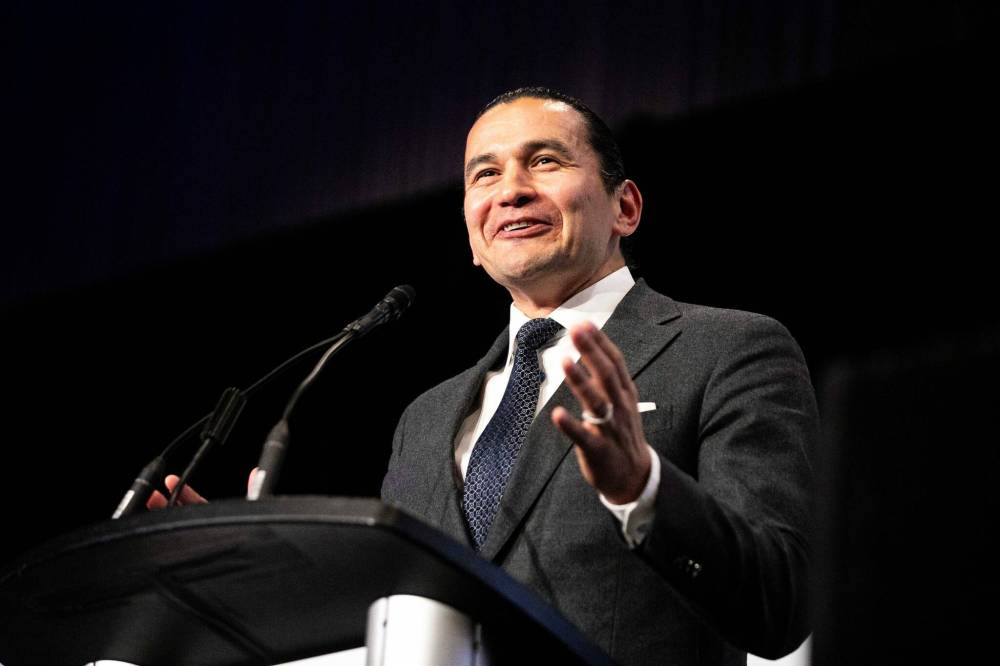Premier Wab Kinew is in North Dakota representing Manitoba’s economic interests two weeks before president-elect Donald Trump takes office with a promise to impose 25 per cent tariffs on imports from Canada.
“Our team’s goal is to fight for your jobs and stand up for our economy and to continue to make sure the future looks bright in Manitoba,” he told reporters on a Zoom call from Grand Forks Monday.
Kinew said he was on his way to the state capitol in Bismarck for the first state of the state address Tuesday by North Dakota Gov. Kelly Armstrong.

MIKAELA MACKENZIE / FREE PRESS FILES
Manitoba Premier Wab Kinew is in the U.S. meeting with local, state and federal officials two weeks before president-elect Donald Trump takes office with a promise to impose 25 per cent tariffs on imports from Canada.
He said all premiers across Canada are taking it upon themselves to strengthen trade relationships south of the border.
“I think that should be a reassuring sign to Canadians and Manitobans,” the premier said.
“While the prime minister has announced his intention to step down, the leaders of the provinces and territories will continue to hold the mantle for Canadians and are hard at work to ensure that we are going to protect your jobs and protect our economy.”
Kinew said his day started with a meeting with U.S. ambassador to Canada, David Cohen, who was appointed to the post by outgoing President Joe Biden. The premier pointed to the strong economic ties Manitoba has to Cohen’s state of Pennsylvania — the main destination for nickel mined in northern Manitoba that’s tied to many blue-collar jobs in the U.S.
His day concluded with a “very productive” call to Wisconsin Gov. Tony Evers.
“It focused on a lot of our economic interests like agriculture and energy exports like hydro electricity we send south of the border.”
In 2011, Manitoba Hydro announced an agreement with Wisconsin Public Service for the sale of 100 MW of hydroelectric power each year from 2021–2027.
Kinew spoke with Armstrong, who was a congressman in the house representatives before becoming North Dakota’s governor with Trump’s endorsement, ahead of Tuesday’s address.
“It focused a lot on prosperity, the ag industry, trade and the fact that so many Manitobans cross the border into North Dakota,” Kinew said, noting both jurisdictions rely on agriculture, transportation and manufacturing industries that are interconnected.
“We share a lot of interests in how we make a living. It makes sense on both sides of the border for us to continue the trade relationship in a good way.”
Without divulging the details of any private conversations, Kinew said the leaders he’s spoken to in the U.S. aren’t in favour of Trump’s proposed tariffs on Canadian imports.
“Generally speaking, across these bilateral conversations that straddle the Canada-U.S. border, Americans are saying loud and clear that they recognize how important it is to keep a strong trading relationship with Manitoba and Canada,” the premier said.
“They want to see the cost of living and the economy move forward in a way that’s good — not having an additional tariff cost imposed on it.”
carol.sanders@freepress.mb.ca

Carol Sanders
Legislature reporter
Carol Sanders is a reporter at the Free Press legislature bureau. The former general assignment reporter and copy editor joined the paper in 1997. Read more about Carol.
Every piece of reporting Carol produces is reviewed by an editing team before it is posted online or published in print — part of the Free Press‘s tradition, since 1872, of producing reliable independent journalism. Read more about Free Press’s history and mandate, and learn how our newsroom operates.
Our newsroom depends on a growing audience of readers to power our journalism. If you are not a paid reader, please consider becoming a subscriber.
Our newsroom depends on its audience of readers to power our journalism. Thank you for your support.